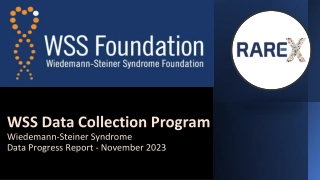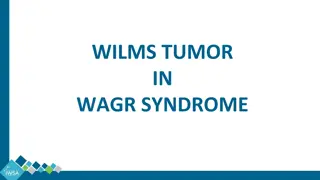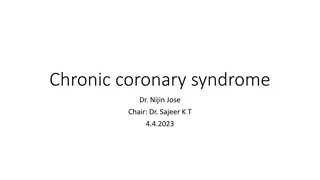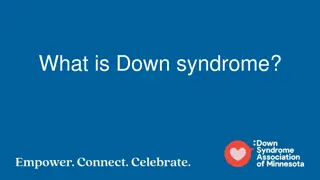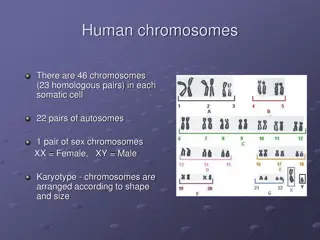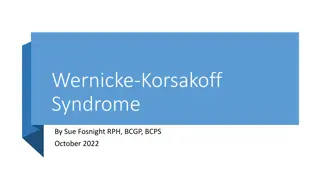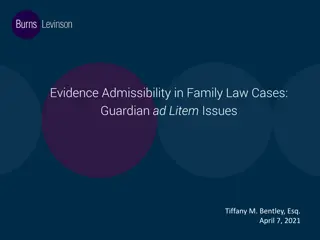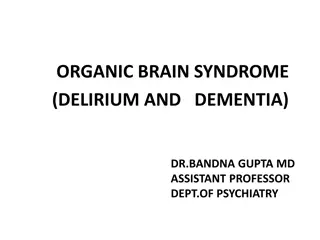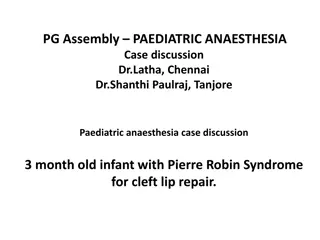Understanding Alpha-Gal Syndrome: A Comprehensive Overview
Alpha-gal syndrome (AGS) is a unique allergy triggered by the Lone Star tick in the US, leading to sensitization to alpha-gal. This presentation covers the cause, symptoms, diagnosis, and treatment of AGS, alongside the overlap with US military installations. Explore the clinical manifestations, geographic distribution, and increasing prevalence of AGS. A detailed case presentation highlights the challenges of diagnosis in a patient with RUQ abdominal pain and a history of tick bites. Discover how AGS affects individuals and the importance of recognizing and managing this condition.
Download Presentation

Please find below an Image/Link to download the presentation.
The content on the website is provided AS IS for your information and personal use only. It may not be sold, licensed, or shared on other websites without obtaining consent from the author. Download presentation by click this link. If you encounter any issues during the download, it is possible that the publisher has removed the file from their server.
E N D
Presentation Transcript
Tick-ed Off About RUQ Pain: Alpha-gal Syndrome Clayton Fuqua, MD LT MC(FS) USN Naval Hospital Camp Pendleton
Disclaimer The views expressed in this presentation are those of the presenter and do not reflect the official policy or position of the United States Navy, Department of Defense or the U.S. Government.
Learning Objectives Understand the cause, symptoms, diagnosis and treatment of Alpha-gal Syndrome Review the geographic distribution of Amblyomma americanum (Lone star tick) and how this overlaps with U.S. military installations Recognize foods, products and pharmaceuticals that contain alpha-gal
Introduction Alpha-gal Syndrome (AGS) is a unique allergy caused by the Lone Star tick (Amblyomma americanum) in the US IgE sensitization to galactose-alpha-1,3-galactose (alpha-gal), which is expressed on the surface of glycoproteins and glycolipids of mammalian cells AGS comprises two clinical pictures: An immediate hypersensitivity reaction to drugs containing alpha-gal A delayed hypersensitivity reaction to the ingestion of red mammalian meat Symptoms of AGS: urticaria, pruritus, anaphylaxis, dyspnea, abdominal pain, nausea, diarrhea and vomiting
Introduction Unique characteristics Delayed and intermittent symptoms Appears later in life First described in 2007 Anaphylactic reactions to cetuximab mostly occurring in the southeastern United States Increasing in prevalence US cases of AGS: 12 in 2009 to 34,000 in 2019
Case Presentation 45 yo ADM presented to clinic with two weeks of severe, intermittent RUQ abdominal pain. Reports two separate episodes which caused nausea and retching a few hours after eating steak and pot roast respectively. He had similar symptoms one year prior. Prior workup with GI: labs, RUQUS, HIDA and EGD which were all normal Past Medical History: GERD, chronic low back pain Medications: Pepcid PRN, ibuprofen PRN Social History: Lives on a large farm in Oklahoma; Originally from Alabama with prior duty station in Virginia; Avid outdoorsman; Several tick bites in past including the past 6 months; Alcohol: 1-2 whiskey drinks 2-3x per week
Case Presentation Workup/Evaluation CBC, CMP, lipase and repeat RUQUS grossly normal Alpha-gal IgE: 23.90 kU/L (normal <0.1) Skin Prick testing: positive for red meats Treatment Plan Avoid red meat and further tick bites EpiPen prescribed Follow up in one year with Allergist for repeat alpha-gal IgE titers
Discussion Alpha-gal Syndrome can manifest solely with GI symptoms Large case series (Mabelane et al) showed ~20% of patients with AGS had isolated abdominal symptoms Reactions can vary Marked intraindividual variability Modulated by cofactors Variation in amount of alpha-gal More prevalent in internal organs and higher fat content meats
Discussion Case Distribution States with highest prevalence of cases: Virginia, North Carolina, Tennessee, Arkansas, Oklahoma and Missouri Random cohorts in TN, VA and NC found that 15% or more of the population have IgE to alpha- gal Serum IgE levels are not indicative of symptoms or severity of reactions
Discussion Treatment Avoidance of red meat Approximately 80% will experience symptom resolution Avoidance of further tick bites Leads to a decrease in titers Rate of titer decline is variable EpiPen for potential anaphylaxis
Conclusion Unique allergy Polysaccharide, delayed symptoms and variability of symptoms with cofactors Increasing awareness, but still appears to be underdiagnosed US military personnel are recruited to active duty from throughout the United States and experience frequent PCS moves Travel, PCS and tick exposure histories can potentially help Active Duty Family Physicians diagnose and help treat their patient s disease process
References Platts-Mills TAE, Li RC, Keshavarz B, Smith AR, Wilson JM. Diagnosis and Management of Patients with the -Gal Syndrome. J Allergy Clin Immunol Pract. 2020 Jan;8(1):15-23.e1. doi: 10.1016/j.jaip.2019.09.017. Epub 2019 Sep 28. PMID: 31568928; PMCID: PMC6980324. Commins SP. Diagnosis & management of alpha-gal syndrome: lessons from 2,500 patients. Expert Rev Clin Immunol. 2020 Jul;16(7):667-677. doi: 10.1080/1744666X.2020.1782745. Epub 2020 Jul 8. PMID: 32571129; PMCID: PMC8344025. Richards NE, Richards RD Jr. Alpha-Gal Allergy as a Cause of Intestinal Symptoms in a Gastroenterology Community Practice. South Med J. 2021 Mar;114(3):169-173. doi: 10.14423/SMJ.0000000000001223. PMID: 33655311. Saretta F, Giovannini M, Mori F, Arasi S, Liotti L, Pecoraro L, Barni S, Castagnoli R, Mastrorilli C, Caminiti L, Marseglia GL, Novembre E. Alpha-Gal Syndrome in Children: Peculiarities of a "Tick-Borne" Allergic Disease. Front Pediatr. 2021 Dec 23;9:801753. doi: 10.3389/fped.2021.801753. PMID: 35004549; PMCID: PMC8732990. Wilson JM, Platts-Mills TAE. Red meat allergy in children and adults. Curr Opin Allergy Clin Immunol. 2019 Jun;19(3):229-235. doi: 10.1097/ACI.0000000000000523. PMID: 30844847; PMCID: PMC6488443. Sharma SR, Karim S. Tick Saliva and the Alpha-Gal Syndrome: Finding a Needle in a Haystack. Front Cell Infect Microbiol. 2021 Jul 20;11:680264. doi: 10.3389/fcimb.2021.680264. PMID: 34354960; PMCID: PMC8331069. Platts-Mills TAE, Commins SP, Biedermann T, van Hage M, Levin M, Beck LA, Diuk-Wasser M, Jappe U, Apostolovic D, Minnicozzi M, Plaut M, Wilson JM. On the cause and consequences of IgE to galactose- -1,3-galactose: A report from the National Institute of Allergy and Infectious Diseases Workshop on Understanding IgE-Mediated Mammalian Meat Allergy. J Allergy Clin Immunol. 2020 Apr;145(4):1061-1071. doi: 10.1016/j.jaci.2020.01.047. Epub 2020 Feb 10. PMID: 32057766; PMCID: PMC7301618.
References Mabelane T, Basera W, Botha M, Thomas HF, Ramjith J, Levin ME. Predictive values of alpha-gal IgE levels and alpha- gal IgE: Total IgE ratio and oral food challenge-proven meat allergy in a population with a high prevalence of reported red meat allergy. Pediatr Allergy Immunol. 2018 Dec;29(8):841-849. doi: 10.1111/pai.12969. Epub 2018 Sep 28. PMID: 30144162. Steinke JW, Platts-Mills TA, Commins SP. The alpha-gal story: lessons learned from connecting the dots. J Allergy Clin Immunol. 2015 Mar;135(3):589-96; quiz 597. doi: 10.1016/j.jaci.2014.12.1947. PMID: 25747720; PMCID: PMC4600073. Macdougall JD, Thomas KO, Iweala OI. The Meat of the Matter: Understanding and Managing Alpha-Gal Syndrome. Immunotargets Ther. 2022 Sep 15;11:37-54. doi: 10.2147/ITT.S276872. PMID: 36134173; PMCID: PMC9484563. Binder AM, Commins SP, Altrich ML, Wachs T, Biggerstaff BJ, Beard CB, Petersen LR, Kersh GJ, Armstrong PA. Diagnostic testing for galactose-alpha-1,3-galactose, United States, 2010 to 2018. Ann Allergy Asthma Immunol. 2021 Apr;126(4):411-416.e1. doi: 10.1016/j.anai.2020.12.019. Epub 2021 Jan 7. PMID: 33422649. Flaherty MG, Kaplan SJ, Jerath MR. Diagnosis of Life-Threatening Alpha-Gal Food Allergy Appears to Be Patient Driven. J Prim Care Community Health. 2017 Oct;8(4):345-348. doi: 10.1177/2150131917705714. Epub 2017 Apr 27. PMID: 28447914; PMCID: PMC5932728. Kim MS, Straesser MD, Keshavarz B, Workman L, McGowan EC, Platts-Mills TAE, Wilson JM. IgE to galactose- -1,3- galactose wanes over time in patients who avoid tick bites. J Allergy Clin Immunol Pract. 2020 Jan;8(1):364-367.e2. doi: 10.1016/j.jaip.2019.08.045. Epub 2019 Sep 11. PMID: 31520841; PMCID: PMC6980488.
Questions? Contact Information Clayton.f.fuqua.mil@health.mil


